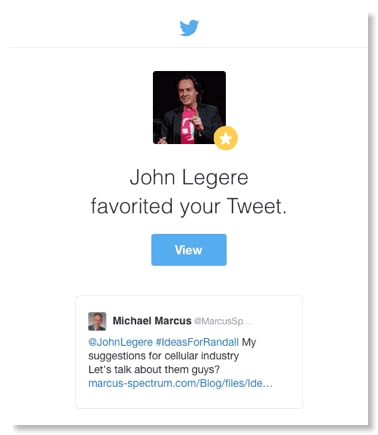#IdeasForRandall
Or you can email all great ideas to me! I’ll take them on Twitter too! Just tag me with your idea & #IdeasForRandall http://t.co/uXenMnBfdv
— John Legere (@JohnLegere) October 13, 2015In the above tweet, T-Mo, "the Un-carrier" asks for comments on what is wrong with the industry. Perhaps we should all tell him that while the cellular industry has made many great contributions to US economic growth and US society, it has persistent blind spots with several unintended consequences of their actions and business plans.

In response to a Tuesday morning report from the LA Times that an AT&T customer’s service improvement suggestions were met with a letter from the carrier’s lawyers, T-Mobile is encouraging customers from any wireless carrier to share their thoughts with the Un-carrier.
As of today, T-Mobile said wireless subscribers across the board are welcome to send their ideas for improving the industry to IdeasforRandall@t-mobile.com or share them with CEO John Legere on Twitter using the tag #IdeasforRandall. In its typical provocative style, T-Mobile said it will take action on the best ideas before forwarding them on to AT&T CEO Randall Stephenson and AT&T’s lawyers.
According to Legere, AT&T’s harsh response to Alfred Valrie, the longtime customer cited in the LA Times article, proves that AT&T and its CEO “don’t care about what customers want. AT ALL.” According to the LA Times report, Valrie received a warning letter from AT&T's lawyers after he emailed Stephenson suggesting the carrier offer "unlimited data for DSL users and 1,000 text messages for $10 a month."
“The entire Un-carrier revolution began by listening to customers,” Legere said in a Tuesday press release. “It’s where we get our best ideas, and I want everyone to keep sending them my way at John.Legere@T-Mobile.com. It absolutely amazes me that Randall would tell a lifelong customer to basically go away and talk to my lawyers. I interact with customers on a daily basis so I can hear their ideas firsthand. It’s called living in the 21st century.”
So, Mr. Legere, here are some ideas for your company and the industry to think about:
- The list of 7 New Year's resolutions I first posted in December 2011. These deal with: Wireless technology innovation, Social harmony and cell phone use,Cell phones use in vehicles, RF safety, Base stations and their environments, “Spectrum scoring” or “How to count to 500”, Provide communications for niche applications that otherwise contend for spectrum with CMRS, & Unrestrained use of anonymous prepaid cell phones. I don't see any progress or even industry interest in any of these topics.
- The lack of US cellular industry interest in 5G above 24 GHz. T-Mo filed comments in Docket 14-177 that were pretty useless and then didn't even file reply comments. How many of the 176 questions in the NOI did T-Mo address in their comments? CTIA & VZW filed also filed comments but no replies. Sprint didn't bother to file either! T-Mo's German parent takes R&D money from the German Government, a major stockholder, for millimeter wave 5G development. Is that related to T-Mo USA's disinterest in FCC policy developments in this technology?
- Why are T-Mo and the major carriers so disinterested in actually suppressing the use of contraband cell phones in prison? These phones have been used to run criminal enterprises as well as to order murders of witnesses. All the carriers seem focused on drawing a "bright line" on making ALL cellular jamming illegal through a twisted interpretation of 47 U.S.C. 333 and directing underfunded prison administrations on only "managed access" as a magical silver bullet when in some locations it really has the same problems. Many maximum security prisons are located in truly remote areas where the most cost-effective solution is carefully designed jamming with strict FCC rules on "over coverage". Cellular carriers have a bad state of denial on over coverage in managed access systems!
- Cellular carriers have been amazingly silent on spectrum policy issues of smartphone use in drones. Do you really want drones to use cellular spectrum for video downlinks? Ask your techies what happens when several drones fly at 1000' in an area where base stations were planned for users below 50'.
- Do T-Mo and other carriers actually support law and order in spectrum enforcement? When FCC decided to decimate its spectrum enforcement staff, the usually powerful CTIA and its members were very ineffective — only extracting a vague promise they would get attention. How much attention will you get from the remaining 44 demoralized agents spread across 50 states and Puerto Rico, especially if they don't get money for training, overtime, and travel to deal with complaints?
- Should cellular carriers support a more rational FCC budget appropriation for noncontroversial spectrum issues such as new technology and enforcement or just continue to demand a lion's share of the remaining resources and hope for the best?
- While I understand why T-Mo and other carriers charge large roaming fees in many cases if you use a US cell phone overseas without making arrangements for a special plan, I do not understand why if you call an overseas number from a cell phone operating in FCC jurisdiction you are charged a per minute rate that approximates the former AT&T's 1970s tariffs of several dollars a minute when the fair market value of an international call today is less than $0.10/minute. Don't such extremely high charges violate Section 201(b) of the Communication Act and are a sign of market failure?
Mr. Legere, next time you are passing through the DC area, I would be glad to meet with you to discuss these issues. Your DC staff knows how to find me.
UPDATE




![Validate my RSS feed [Valid RSS]](valid-rss-rogers.png)

